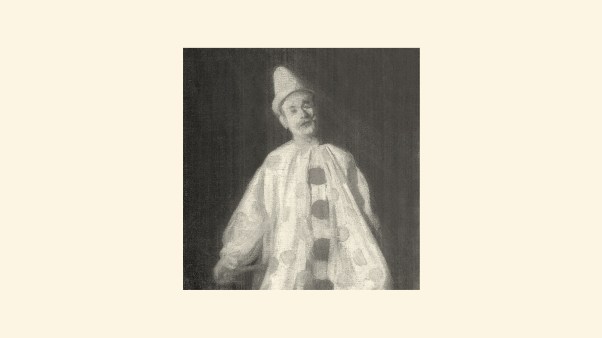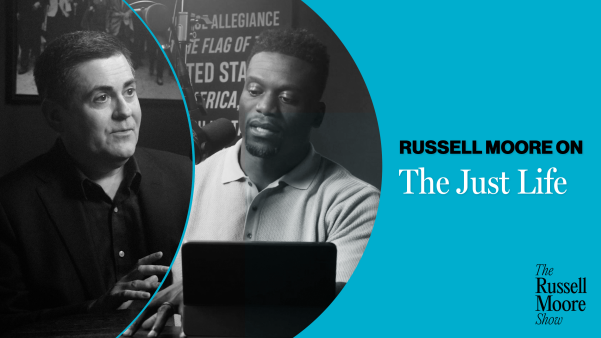In Fantastic Four: Rise of the Silver Surfer, when we first catch up with the Fantastic Four—Reed Richards, Mr. Fantastic (Ioan Gruffudd); Sue Storm, the Invisible Girl (Jessica Alba); Johnny Storm, the Human Torch (Chris Evans); and Ben Grimm, the Thing (Michael Chiklis)—they’re trying to catch a flight. “I’m sorry, Mr. Richards, we’re overbooked,” the counter agent tells him. “You’ll have to fly coach.”
Uh huh. That’s a little like Stephen Hawking, Paris Hilton, Brad Pitt and The Rock all getting bumped from first class. The Fantastic Four, having no secret identities, are global celebrities and media darlings. Reed and Sue’s marriage plans have sparked the same sort of media frenzy as Tom and Katie’s nuptials, or Brad and Angelina’s dalliance. Johnny is a glory hound, living for the spotlight. Bumped to coach? Cosmic ray–induced super powers, outer-space surfboards, world-consuming celestial vortices I can accept, but suspension of disbelief only goes so far.
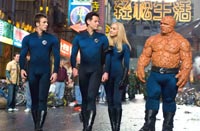
It’s the first false note in a film that doesn’t strike a whole lot of right ones. Of course, I felt the same way—and then some—about the first Fantastic Four film (though Christianity Today Movies’ Russ Breimeier gave it a generally positive review). With more ambitious action sequences, cooler special effects, and a slightly lower level of obnoxious and trashy behavior from the Torch, I suppose the sequel is the better film, as well as the more family-friendly one. This should be welcome news to the family audiences who helped make Fantastic Four a hit—though I personally wouldn’t recommend either film to family audiences, or anyone else.
Although the subtitle refers to his “rise,” the Silver Surfer in fact descends to earth in the film’s opening scenes, a gleaming metallic figure looking a lot like the liquid metal Terminator from T2 on a flying surfboard. (The CGI Surfer is voiced by Laurence Fishburne, with a motion-capture physical performance from Doug Jones of Pan’s Labyrinth. I’m not sure it made much difference; the character could have been entirely animated for all I could tell.)
Though his passing wreaks havoc everywhere he goes, the Silver Surfer is not the true enemy. He is only the herald of a far greater threat, the world-devouring force of nature known as Galactus (in the comics a giant humanoid alien, here a planet-sized vortex in outer space). Bound to serve Galactus in exchange for the sparing of his own homeworld, the Surfer has no choice but to lead Galactus to other living worlds in order that his own world might live. Rise of the Silver Surfer also features returning villain Dr. Doom (Julian MacMahon), every bit as unimpressive as in the first film.
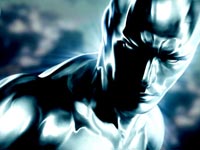
Alarmed by the destruction caused by the Surfer’s passing, the government, in the person of one General Hagar (Andre Braugher), turns for help to Reed Richards. Reed, however, has other fish to fry. He’s getting married, and Sue doesn’t want him getting all caught up in techno-nerdy stuff when he should be preparing for the wedding. Reed assures her he’s off the science beat, even going so far as to turn down General Hagar’s request for help. However, Reed isn’t being honest—his scientific work continues behind Sue’s back, and, after winning her approval for passing on Hagar’s project, Reed proceeds to work on the general’s request anyway.
Will Sue find out about Reed’s deception? When Johnny threatens to spill the beans, Reed tries to keep him quiet by acquiescing to the bachelor party he previously nixed on the grounds that Sue wouldn’t like it. At least Reed draws the line at exotic dancers, though he isn’t unwilling to get jiggy on the dance floor with some slinky young hotties—just in time for Sue to walk in and see him, of course. Not to worry, though. “I know you,” Sue smiles understandingly, adding, “Besides, that was nothing compared to what I did at my bachelorette party. That was wild.”
Eventually, Sue does uncover Reed’s deception about his extracurricular science projects. Reed tries to explain: “The only reason I didn’t tell you was that I didn’t want you to worry.” Um, no—the reason you didn’t tell her was that you didn’t want her to know that you were taking time out from wedding preparations to do science stuff, remember?
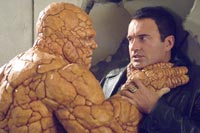
But Sue doesn’t point that out. Instead, she says only that building General Hagar’s doohickey was the right thing to do. Fair enough—but it was wrong to deceive her, right? No, Sue doesn’t mention that either. Instead, she’s preoccupied with the feasibility of raising children in their high-profile hugger-mugger lives. Doesn’t either of these newlyweds-to-be care a whit about, oh, their relationship?
Perhaps this is what is most fundamentally wrong with the Fantastic Four franchise: None of these allegedly “fantastic” heroes has any gravitas, any actual heroic weight or depth of character. There’s nothing particularly noble, compelling or even interesting about them. Far from inspiring admiration, they don’t rise even to the level of thinking, acting and relating like grown-ups.
Take Reed, who is supposed to be the team leader. He may be “one of the greatest minds of the 21st century”—as he himself crisply informs General Hagar in a rare assertive moment. But he’s a lightweight in, well, just about every other category imaginable. Sure, you might be able to count on him in a pinch to come up with a bright idea for a “tachyon pulse,” say. But he’s woefully lacking in the qualities we look for in leaders. Vision, decisiveness, charisma, integrity, brio—you name it, Reed hasn’t got it.
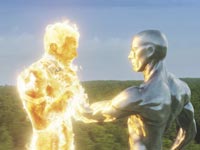
Incidentally, in that same assertive speech, Reed also boasts that he’s “engaged to the hottest woman on the planet.” Yet as a husband-to-be, Reed comes off no better than as team leader, lacking such qualities as honesty, responsibility and commitment. (Even so, Reed’s uncharacteristic display of bravado moves Sue to whisper to him, “I’m so hot for you right now.”)
Even on his own intellectual turf, Reed lacks the bearing of a heavyweight. Struggling to come up with the answer that will save the world, Reed brushes off Sue’s soothing efforts to encourage him, whining petulantly, “No, it won’t be all right! The whole world is counting on me! What if I fail?” Where is Edna Mode when you need her to slap some sense into a super? “What are you talking about? Pull yourself together! Fight! Win!”
The Thing, alas, has lost the vestigial tragic poignancy he had in the first film, and is now a purely lightweight comic figure and a foil for the obnoxious Torch. “Just how do you and Alicia … ?” the Torch muses suggestively to an outraged Ben. “I don’t want to wake up one morning and hear she was killed in a rockslide.” Oh, that’s classy.
Even General Hagar, an antagonist and a patsy, finally gets so fed up with their petty bickering that he exclaims in disgust, “What the hell is wrong with you people?” Now there’s a line that rings true.
Talk About It
Discussion starters- When the Silver Surfer tells Sue that he “has no choice” about serving Galactus, she replies that “There’s always a choice.” What does this mean? Is there always a choice? Why do people sometimes say that they “have no choice”? Is this really true? How can we exercise choice even under such circumstances?
- What do you think of the Silver Surfer’s original agreement with Galactus to become his herald in exchange for the sparing of his homeworld? Was this a heroic choice or an evil one? What about his final act? Why do you think this act occurs when it does, and not before?
- General Hagar implies that because the Silver Surfer is not human, he has no human rights and therefore can be tortured. If there is life on other planets, would it have rights? Do animals have rights? If so, how are they different from human rights? How might we ascertain what rights to accord alien beings if we encountered them?
The Family Corner
For parents to considerFantastic Four is rated PG for sequences of action violence, some mild language and innuendo. The stylized comic-book action violence includes a sci-fi killing in which a man’s body is partially shattered like a statue. Some scantily clad women dance provocatively in a party sequence, and there are various references to “hot” women, a woman telling a man how “hot” she is for him, and oblique but crude speculative references to the Thing’s sexual relationship with his girlfriend. There are also references to torture and a sequence of implied torture of a prisoner. Language includes a number of crude expressions and at least one misuse of God’s name.
Photos © Copyright 20th Century Fox
Copyright © 2007 Christianity Today. Click for reprint information.










